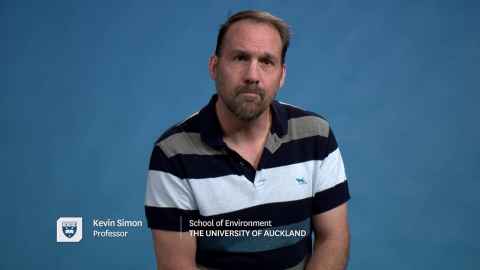Programme overview
With an emphasis on transdisciplinary knowledge, you will study a range of topics within the School of Environment. Areas the programme focuses on include water-use and governance, air and water quality, ecosystem ecology, environmental modelling and analysis, climate change, and resource management.
Graduates of the MEnvSci will have developed the crucial conceptual and practical skills required of professional environmental scientists in research and industry.
Programme structure
All students are initially enrolled in the taught stream. Transfer to the Research stream is possible after the first Semester.
180-point taught masters
- 15 points: ENVSCI 711 Assessing Environmental Effects
- At least 90 points from:
ENVSCI 701 Research Practice in Environmental Science
ENVSCI 703 Research Topics in Environmental Science
ENVSCI 704 Modelling of Environmental Systems
ENVSCI 705 Handling Environmental Data
ENVSCI 706 Special Topic
ENVSCI 707 Directed Study in Environmental Science
ENVSCI 708 Ecosystem Dynamics
ENVSCI 713 Air Quality and Atmospheric Processes
ENVSCI 714 Environmental Pollution
ENVSCI 737 Applied Terrestrial Ecology
ENVSCI 738 Water and Society
Marine 707 Applied Estuarine Ecology
- Up to a further 45 points from:
EARTHSCI 705 Geohazards
EARTHSCI 720 Geochemistry of our World
GEOG 730 Climate Change: Past, Present, and Future
GEOG 745 Applied Fluvial Geomorphology
GEOG 746 Applied Coastal Geomorphology
GEOG 748 Current Issues in Coastal Management
GEOG 749 Applied Climate Science
GEOG 771 Spatial Analysis and Geocomputation
ENVMGT 742 Social Dimensions of Global Environmental Change
ENVMGT 744 Resource Management
MARINE 703 Marine Protected Areas or approved 700 level courses
- 30 points: ENVSCI 790 Project
180-point research masters
- 30 points:
ENVSCI 701 Research Practice in Environmental Science
ENVSCI 705 Handling Environmental Data
- At least 30 points from:
ENVSCI 703 Research Topics in Environmental Science
ENVSCI 704 Modelling of Environmental Systems
ENVSCI 706 Special Topic
ENVSCI 707 Directed Study in Environmental Science
ENVSCI 708 Ecosystem Dynamics
ENVSCI 711 Assessing Environmental Effects
ENVSCI 713 Air Quality and Atmospheric Processes
ENVSCI 714 Environmental Pollution
ENVSCI 737 Applied Terrestrial Ecology
ENVSCI 738 Water and Society
MARINE 707 Applied Estuarine Ecology
- Up to a further 30 points from:
EARTHSCI 705 Geohazards
EARTHSCI 720 Geochemistry of our World
GEOG 730 Climate Change: Past, Present, and Future
GEOG 745 Applied Fluvial Geomorphology
GEOG 746 Applied Coastal Geomorphology
GEOG 748 Current Issues in Coastal Management
GEOG 749 Applied Climate Science
GEOG 771 Spatial Analysis and Geocomputation
ENVMGT 742 Social Dimensions of Global Environmental Change
ENVMGT 744 Resource Management
MARINE 703 Marine Protected Areas or other approved 700 level courses
- 90 points: ENVSCI 794 Thesis
Postgraduate pathway
Download the Science postgraduate pathway (117KB, PDF)
You'll also need to meet other requirements, including time limits and total points limits. See Postgraduate enrolment.
2025 entry requirements
My highest qualification is from:
Programme requirements
Minimum programme requirements
Minimum requirements listed here are the likely grades required and do not guarantee entry. We assess each application individually and applicants may require a higher grade to be offered a place.
-
Study optionTaught 180 pointsGrade requiredGPA Grade Point Average 4.0
-
Study optionResearch 180 pointsGrade requiredGPA Grade Point Average 4.0
Further programme requirements
Select your study option:
You must have completed an undergraduate degree in Science with a GPA of 4.0 or higher in 60 points at Stage III in Environmental Science, or a related subject such as Biology, Chemistry, Earth Sciences, Geography and Geology.
You must have completed an undergraduate degree in Science with a GPA of 4.0 or higher in 60 points at Stage III in Environmental Science, or a related subject such as Biology, Chemistry, Earth Sciences, Geography and Geology.
Other pathways to study
If you do not meet the above entry requirements, but have other relevant experience and think you would be successful in postgraduate study, please contact us to discuss alternative pathways into our programmes.
Programme requirements
Minimum programme requirements
Minimum requirements listed here are the likely grades required and do not guarantee entry. We assess each application individually and applicants may require a higher grade to be offered a place.
-
Study optionTaught 180 pointsGrade requiredGPE Grade Point Equivalent 4.0
-
Study optionResearch 180 pointsGrade requiredGPE Grade Point Equivalent 4.0
-
QualificationIELTS Academic International English Language Testing SystemScore required6.5
No bands less than 6.0
Further programme requirements
Select your study option:
You must have completed an undergraduate degree in Science from a recognised university (or similar institution) with a GPE of 4.0 or higher in 75 points at Stage III in Environmental Science, or a related subject such as Biology, Chemistry, Earth Sciences, Geography and Geology.
You must have completed an undergraduate degree in Science from a recognised university (or similar institution) with a GPE of 4.0 or higher in 75 points at Stage III in Environmental Science, or a related subject such as Biology, Chemistry, Earth Sciences, Geography and Geology.
How much does a Master of Environmental Science cost per year?
2025 fees
- Domestic students
- NZ$10,892.40*
- International students
- NZ$52,842*
Fees are set in advance of each calendar year and will be updated on this website. Fees are inclusive of 15% GST, but do not include the Student Services Fee, course books, travel and health insurance, or living costs. Amounts shown are indicative only. In addition to the tuition fees, there is a Student Services Fee of $9.24 per point, estimated at $1,108.80 for full-time study (120 points). Fees will be confirmed upon completion of enrolment into courses.
*Please note: amounts shown are indicative and estimates only.
Find out about financial support information
Scholarships and awards
Find out about the scholarships you may be eligible for.
Student loans and allowances
Are you a New Zealand citizen or resident? You could be eligible for a student loan or allowance.
Cost of living
Get an idea of how much accommodation and general living in Auckland will cost.
Key dates
Please note: We will consider late applications if places are still available. International students should start the application process as early as possible to allow sufficient time to apply for a visa.
Application closing dates
- Semester One 2025
- 8 December 2024
- Semester Two 2025
- 4 July 2025
Where could this programme take you?
This programme is an advanced qualification in environmental science. You will gain the fundamental and essential skills for a career in industry or research in the field of environmental science.
Jobs related to this programme
- Atmospheric scientist
- Environmental data analyst
- Environmental health and safety technician
- Environmental management
- Environmental policy and planning
- Environmental scientist
- Science communications

Hasib aspires to share his knowledge from his Master of Environmental Science with his community.
Read moreStudent career planning service
Once you become a student at the University, you can get help with planning and developing your career from Career Development and Employability Services.
Experience the University

Master of Environmental Science
Find out more about the Master of Environmental Science programme with Professor Kevin Simon
Do you need help?
Can’t find the answer in AskAuckland?
Need to speak to someone?
You can phone us directly.
- Auckland
- 923 5025
- Outside Auckland
- 0800 61 62 63
- International
- +64 9 373 7513
